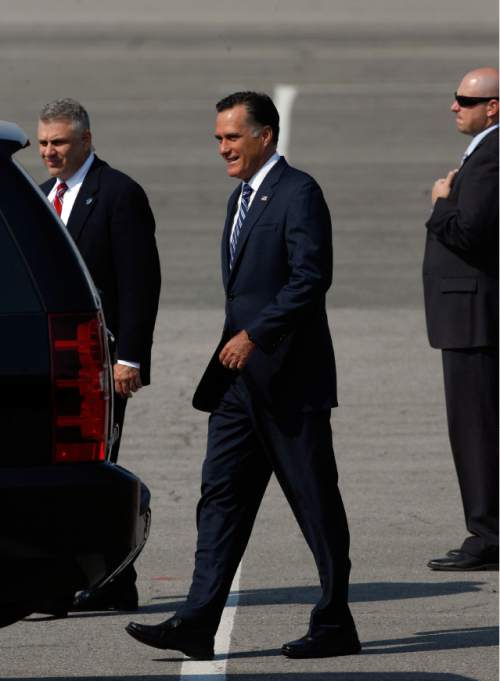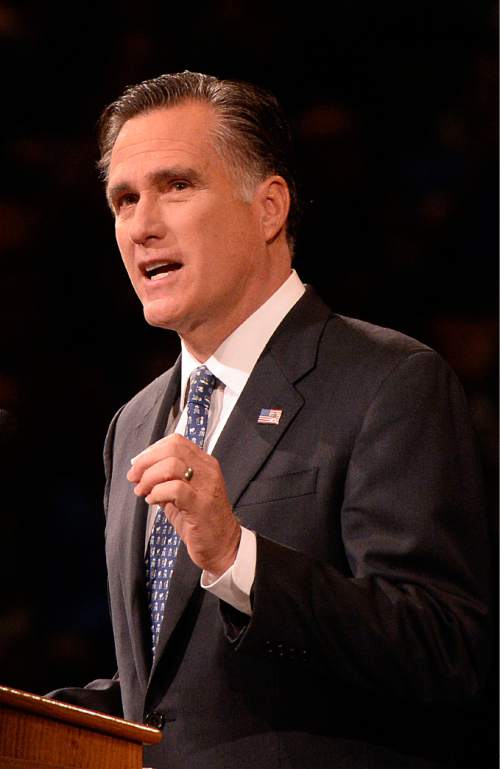This is an archived article that was published on sltrib.com in 2015, and information in the article may be outdated. It is provided only for personal research purposes and may not be reprinted.
Washington • Ronald Reagan did it.
And if there's someone Mitt Romney likes to imitate, it's Reagan.
As Romney, the two-time presidential candidate who now lives in Utah, weighs a third run at the presidency, those close to him note that Reagan won his third time around.
But Romney still faces a daunting task: persuade Americans who didn't elect him two years ago to give him another shot.
Historically, it has not turned out well for also-rans to run again, but Romney's friends say they see an opening that could rocket their guy back as the Republican nominee and, this time, into the White House. After all, polls show Romney leading the GOP field, his donor base is ready to write checks and a veteran team is awaiting reassembly.
More important, Romney feels up to the challenge. He's upbeat and excited, friends say, and his family believes this go-round, he'll be ready.
"He's always been motivated by more than anything a desire to serve," says Tom Rath, a New Hampshire consultant with whom Romney spoke after hinting at a 2016 bid. "Without sounding too crazy here, he loves the country; he likes big challenges; he likes to do important things; he has the capacity to do those important things."
Whether he gets a shot — or makes the plunge official — is yet to be seen. Romney comes to the match this time with some big advantages and some bid-killing negatives, starting with the fact that few candidates have been able to mount a successful third run.
—
Nixon and Reagan • Romney's supporters love to point out that it took Reagan, an icon for the GOP, three tries to make it to the Oval Office. But the circumstances aren't parallel. The-actor-turned-California-governor did run three times, but his first two bids for the nomination came up short.
Romney, after losing to Sen. John McCain, R-Ariz., in his first try for the Republican nod, captured it in 2012 only to be defeated by President Barack Obama by 5 million votes and 126 electoral votes. For an example of what can be done, Romney can look back to Richard Nixon, the GOP nominee who lost to John F. Kennedy in 1960 but came back to win in 1968.
Others have pointed to Grover Cleveland for comparison. He nabbed the Democratic nomination and won the presidency in 1884 only to lose re-election four years later. He came back a third time and took back the White House in 1892.
"History is not replete with examples to give Mr. Romney cause to be optimistic about losing the election and then subsequently winning it later," says Peter Brown, assistant director of the Quinnipiac University Poll in Connecticut.
Beyond the historical challenge, Romney also faces other daunting tasks, like explaining to his own party how he can be a better candidate than last time around, especially given that his detractors were able to paint him as a candidate aloof to regular Americans' worries.
"It is very difficult to change someone's opinion of you the second time around," Brown says. "It's exponentially difficult to change it the third time around. … I would say that you never get a third time to make a first impression."
To Romney's friends, though, another race offers the opportunity to learn from mistakes of the past and the ability to run as the I-told-you-so candidate.
—
'Already vetted' • While Romney had said repeatedly that he wasn't running in 2016, he never really stopped preparing for another bid. Since losing in 2012, he hasn't shied away from helping Republican candidates across the country, either on the stump or with fundraising.
He has kept up appearances on cable shows and in major newspapers, often to criticize Obama and harking back to what the GOP candidate had argued in his campaign against the president.
When Russia seized Crimea, Romney's allies noted how Obama had jeered him for calling Russia America's No. 1 geopolitical foe. When the rollout of the Affordable Care Act stumbled, Romney was there to point out he had raised concerns about it. And even though the economy is picking up, Romney has been critical, arguing that the Obama White House's approach hampered a more robust recovery.
Of course, Romney has long since been branded in a way that hamstrung his previous runs, but supporters say he's the only candidate who has already gone through the wringer, and is now ready to overcome the jabs.
"Part of the sales pitch to the Republican base is he's fully vetted," says Rep. Jason Chaffetz, a Utah Republican who campaigned for Romney in multiple states in 2012 and also spoke with him after the recent news about a possible third bid. "He was right on policy, he's fully vetted and he can raise a billion dollars and beat Hillary [Clinton]."
Chaffetz notes that voters are already tired of the potential 2016 candidates, such as Clinton, the former first lady, senator and secretary of state, and Jeb Bush, the brother of President George W. Bush and son of President George H.W. Bush.
"The appetite for a new, fresh approach, particularly when it comes to the economy, is right in Mitt Romney's wheelhouse," Chaffetz says. "Looking back, the positions Governor Romney took on foreign policy have been absolutely spot on. He's got that one-two punch that nobody else in the field will be able to come up with."
Having run twice before, Romney also has the advantage of being able to pull together a campaign structure in little time, with a donor base that's ready to sign checks. It was no accident that Romney told a group of one-time, and possibly future, contributors that he was weighing a third bid, and then joked that they should, "tell your friends."
"I agree it is rare for a candidate to come back around this way," says Thomas Wright, former chairman of the Utah Republican Party and a Romney backer. "But I've never seen a situation where so much of the country has had buyer's remorse over a presidential election like we've seen on this one. ... Mitt could do a dozen 'I told you so' ads on everything from Russia policy to the terror threat to the economy."
One thing Romney may not have to contend with this time around, should he run, is the nagging question about his faith that dogged him in 2008 and 2012.
—
The Mormon question • Romney's first bid brought unending questions about his membership in The Church of Jesus Christ of Latter-day Saints, including ones offensive to the faithful about "magic underwear" and polygamy.
That concern was tempered a bit in 2012, and Romney even embraced it to a degree at the Republican National Convention, where Mormons touted his leadership role in their local congregation.
And this time around?
"It will actually be a positive," says Wright, himself a Latter-day Saint. "It's funny that a number of things that were used as weapons against Mitt in that campaign are now seen as strengths in the rearview mirror, especially in contrast with the current administration. Mitt has become more appreciated as a person and a leader with time."
Wright may have hit on something. While in 2008 Romney's name often was paired with the fact he is Mormon in major news stories, that largely hasn't been the case since Romney teased a third bid.
Another point that may help: The Netflix documentary "Mitt" that showcased Romney in more intimate moments with his family, praying before or after events, playing with grandkids and talking about his faith.
Rath, the New Hampshire consultant, says for those who saw the movie, it finally showed the side of Romney that many Americans hadn't seen.
"The caricature that was popularized on late-night TV — there was never an effective, from the campaign, counter-narrative to that. And then this movie came out," Rath says. "A lot of people who didn't know him, came to respect him."
That doesn't mean Romney will skate on other issues that haunted his previous runs.
—
Ready and waiting • From Romney's "47 percent remark," to his comment about firing people, to his business role at Bain Capital, to the picture of Romney and his business pals with money falling out of their pockets, Democrats and rival Republicans have a pile of opposition research to pluck from in a Romney redo.
While being vetted can be a positive, as Romney friends suggest, it also means all the negative materials are ready and waiting.
"When you look at Romney, it's easy to forget just the volume of revelatory gaffes" that exist, says Ben Ray, communications director of American Bridge, a left-leaning opposition research group.
"He did stuff over and over again that reinforced what Democrats were saying about him, what voters thought about him: ... that he doesn't care about the poor, that he likes to fire people, [that] Ann [Romney] drives a couple of Cadillacs. ... He did such a good job as presenting himself as an out-of-touch rich guy and even before you get into his business record, he's got real problems."
The McCain campaign's 200-page research on Romney leaked after the 2008 race, and several Democratic-aligned groups, like American Bridge, have released white papers outlining Romney's faults.
Even one-time Republican supporters publicly criticized Romney after the 2012 loss, complaining about his lackluster appeal and efforts as a candidate, quotes that are likely to resurface in another campaign.
Even since the 2012 election, Romney has helped with a private-equity firm — founded by his son Tagg and right-hand-man, Spencer Zwick — that has come under fire.
"He's not, by any means, a closed book," Ray says. "There's still stuff to come."
—
Will he or won't he? • Those in Romney's camp are fairly sure their guy is in. While he may not officially announce until later this spring, his friends don't see Romney playing up the idea of a bid unless he was seriously considering it.
Rath says Romney's family is on board with the run — and they discussed such a decision over the Christmas holiday, a tradition for Romney as he approached his 2008 and 2012 campaigns. While other ex-presidential candidates have gone on to build houses or promote causes, or paint, Rath says he doesn't see Romney as one who would just walk away and retire.
"I don't think he knows how to do that," Rath says. "He's good at a lot of things but inactive is not one."







